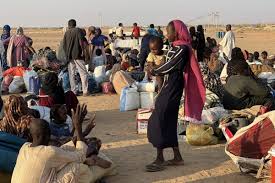- Details
- East Africa
- 189

More than 107,000 people have fled El Fasher and surrounding villages in North Darfur, western Sudan, following the takeover of the city by Rapid Support Forces (RSF) on 26 October, the International Organisation for Migration (IOM) reported on Sunday.
The IOM said in a statement that an estimated 107,294 people, about 24,221 families, were displaced from El Fasher and nearby villages between 26 October and 8 December due to rising insecurity.
Most of the displaced, around 72 per cent, have stayed within North Darfur, mainly in the northern and western parts of the state.
The organisation added that about 19 per cent of those displaced have moved to other states in Sudan, including Central Darfur, Northern State, and White Nile.
According to the agency’s field teams, three-quarters of the people displaced since 26 October were already internally displaced, including those who had previously left major camps such as Zamzam and Abu Shouk or other areas within El Fasher during earlier escalations, and were forced to move again after 26 October. Memo






